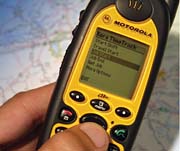Technology Update: Location-based Services

Recognizing that staying abreast of the whereabouts of workers and assets is a critical factor in maintaining an efficient business, Nextel has introduced global positioning system (GPS)-enabled handsets that allow customers to perform various activities and tasks. By using a simple application on a mobile phone, field personnel can perform a myriad of tasks - including completing and sending work orders, receiving work assignments, ordering parts, assessing crew performance, dispatching and routing support, and downloading driving directions.
Almost any of those productivity applications can be enhanced with GPS functionality because LBS improves business efficiency. For example, dispatchers can monitor the precise location of field crews to make sure that an employee closest to the customer answers the service call. Office teams also can track shipments of building supplies to help better manage and utilize the time of site workers. With the construction industry's increasingly mobile workforce, location-based services are quickly becoming a critical business requirement, and Nextel is offering a suite of applications that meet the industry's needs. And, because cost and complexity are no longer barriers to the widespread adoption of LBS, customers have an array of affordable GPS-enabled mobile phones to choose from and an endless number of wireless applications to meet their needs.
Nextel's suite of wireless applications include:
Location: Employees know where they are going all the time. They can hear and see turn-by-turn audible driving directions on a Nextel phone, which allows them to keep hands free and eyes on the road. In addition, they can enter a destination and get directions based on the current GPS location. And, they can receive notification when they have gone off the predetermined course and automatically get a recalculated route
Navigation: These new offerings allow you to view the location of all of your mobile workers from a single dispatch location and communicate instantly using cellular, Direct Connect or Two-Way messaging technology. You can reduce costs by sending the closest employee to the customer. Phone-based maps and driving directions increase efficiency, and customer service is improved by communicating location of workers. Employees and vehicles stay safe
Manage: Know where every vehicle is, every moment of the day. Location-based services allow you to optimize routes and loads with improved planning and better information. You can improve customer service by tracking departure, travel and arrival times; reduce the costs of overtime and unauthorized mileage; print activity reports and reroute employees quickly with accurate directions to their next stop.
So, what does this mean for roofing companies? Today's wireless handsets are more than just cell phones - they are powerful, portable computing devices optimized for running data applications. With roofing companies receiving service requests through all channels, including the Internet, the need for contractors to remain connected at all times is paramount. The data competency of today's wireless handsets means one more open channel to the customer and to the organization as a whole. These productivity tools are enabling the industry to set a higher standard in responsiveness, creating a competitive advantage through superior customer service.
As many in the construction industry already know, ensuring that workers are in the right place at the right time can mean the difference between making a customer happy or unhappy. That translates into a simple equation of gaining or losing additional business and, ultimately generating a positive or negative impact on your company's bottom line.
Looking for a reprint of this article?
From high-res PDFs to custom plaques, order your copy today!







